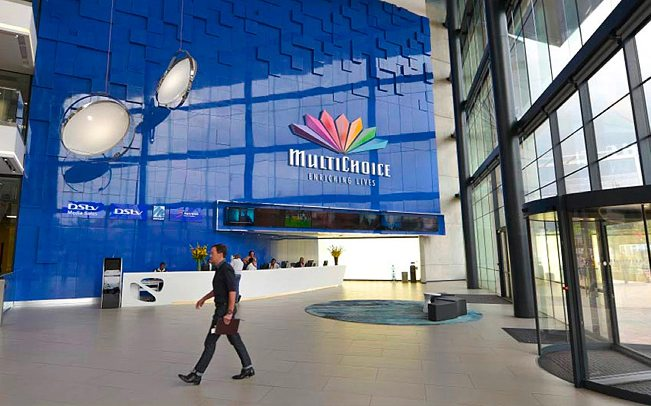
MultiChoice and Canal+
take on the US platforms
Canal+’s acquisition of the South African parent company of DStv and Showmax will allow the French audiovisual group to create a behemoth with 50 million subscribers, of which 30 million are in Africa. This is good news for African audiovisual production.
Instead of wasting energy on a pointless confrontation, two rivals have more to gain by joining forces against a common adversary. Canal+ and MultiChoice, both battling competition from American streaming platforms, have realised this: the French audiovisual group (26 million subscribers, including eight million in 25 countries across Africa) is to make a takeover bid for the South African company, which owns the DStv satellite bouquet (23 million subscribers, including nine million in South Africa, in 16 English and Portuguese-speaking African countries) and the Showmax streaming platform (1.8 million).
The company, controlled by the Bolloré family, already had a 43.5% stake in MultiChoice. The French group is offering to buy back each share for 125 rand (6.30 euros), which should cost it around 1.54 billion euros. Canal+, which in 2023 crossed the threshold of 6 billion euros in revenue, has sufficient cash. According to Bloomberg, South African businessman Patrice Motsepe, head of the Confederation of African Football (CAN), is ‘in talks’ with Canal+ to join its bid.
A panel of experts appointed by MultiChoice to evaluate the French bid judged it to be ‘reasonable’ in early June, with Canal+ intending to maintain the group's listing on the Johannesburg Stock Exchange (JSE). However, the takeover process will have to wait for South African government approval. The national press is hailing this marriage, noting the opulence of the French dowry: the Vivendi group, parent company of Canal+, 'owns publishers, Universal Music, video games, shares in mobile telephony, etc. Being part of it could therefore be a huge bonus for MultiChoice, which is in the process of transitioning, as fast as its little legs can carry it, from a bouquet of satellite channels to a streaming service’, writes Tim Cohen in The Daily Maverick, highlighting the potential for synergies. Ray Mahlaka, also with The Daily Maverick, observes that ‘some shareholders see [this takeover] as a blessing and an opportunity to get rid of their investment in MultiChoice’, whose shares have dropped 22% in recent months. He adds that this alliance ‘should boost the audiovisual business in many African countries, in South Africa, Nigeria, Senegal and Cameroon’. Curiously, no one in South Africa seems to be worried about the ultra-conservative editorial line of the Bolloré group's French media, or about the consequences this political commitment could have for MultiChoice.
Investing in local content for international viewing

“MultiChoice will be the most ambitious acquisition in the history of Canal+”, said an enthusiastic Maxime Saada, chairman of the audiovisual group's management board, in a recent interview with French newspaper Le Figaro, anticipating the creation of “a formidable group with a global subscriber base of close to 50 million, including 30 million in Africa”.
This ‘consolidation’ will enable Canal+ to invest more in content production, by amortising its investments over a wider subscriber base. With Canal+ devoting 3.5 billion euros to production, and MultiChoice 1.2 billion, the group's investment in series and film content could reach 5 billion euros by 2026. “Africa offers great prospects, with rich and varied stories and a wealth of talent”, said Saada. By investing in productions made in Africa, Canal+ has been able to attract new customers from the African middle class. The French group is a majority shareholder in three African production companies (Plan A in Côte d'Ivoire, Roh Studios in Nigeria and Zacu Entertainment in Rwanda) and also has a stake in Senegal's Marodi TV. MultiChoice and Canal+ recently co-produced Spinners, an eight-part series about Cape Town’s townships. Historically, Africa has been central to the growth of the gigantic group founded by Vincent Bolloré, which is omnipresent in Africa’s logistics and port infrastructure. According to radio station France Info, the French justice system plans to bring a case against the Brittany-born industrialist, who has been under investigation since 2018 on suspicion of corruption in Togo and Guinea.
The continent is playing an increasingly important role in Canal+'s development strategy: with eight million subscribers, a third of its customer base is already located there, compared with a quarter (six million) just five years ago. By 2028, Canal+ should have 11 million subscribers in Africa, compared with just 1.6 million in 2014! Faced with competition from streaming and video-on-demand (VoD) platforms, the pay-TV market is in decline around the world... except in Africa, where it is holding up well. According to specialist firm Digital TV Research, pay-TV revenues are set to reach 6.5 billion dollars in 2028, compared with 5 billion in 2022. The number of subscribers is expected to grow from 41 million in 2022 to 57 million in 2028.
Challenging US streaming platforms
Canal+ also intends acquiring Hong Kong-based streaming platform Viu, which has 13 million subscribers in South-East Asia and in which it already holds a 30% stake. The acquisition of both MultiChoice and Viu could give Canal+ more than 60 million subscribers worldwide by the end of 2026. Through this expansion policy, the French group is seeking to rival the American streaming and VoD giants: Netflix (260 million subscribers worldwide), Amazon Prime (200 million) and Disney+ (150 million). Competition is fierce: in Africa, according to a report by Francophone pan-African news agency Ecofin Pro, these platforms could grow by 125% in six years, from eight million subscribers in 2023 to 18 million by 2029!
Canal+ has transformed MyCanal, its catch-up TV platform, into an app offering VoD, streaming and Television over the Internet (IPTV).
MultiChoice has also invested in the Showmax streaming platform: ‘By offering more local African content, the group is competing against foreign competition on the basis of its knowledge of African demand’, says the Ecofin Pro report. However, this is ‘not enough to withstand the onslaught of streaming platforms’, as the pay-TV model remains more expensive for subscribers than that of streaming platforms. In the space of six months, DStv, MultiChoice's satellite bouquet, has lost 400,000 of its most expensive premium package subscribers. On the other hand, by late 2023 Showmax had overtaken Netflix, with 1.8 million subscribers in Africa, compared with 1.6 million for the US platform.